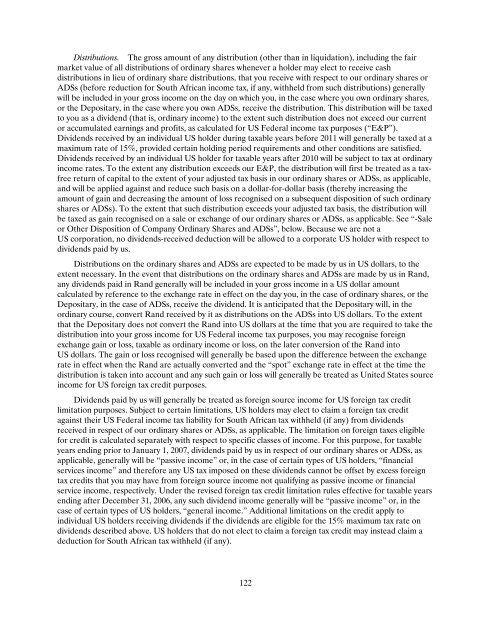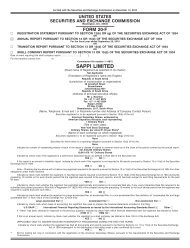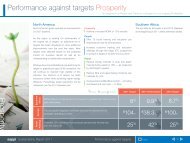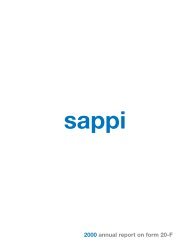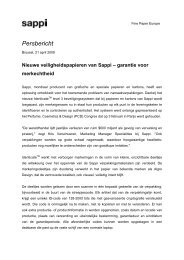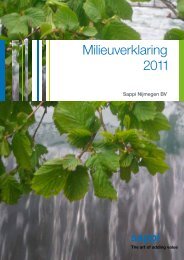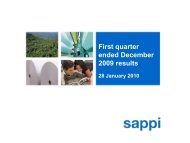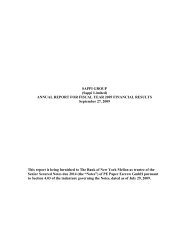You also want an ePaper? Increase the reach of your titles
YUMPU automatically turns print PDFs into web optimized ePapers that Google loves.
Distributions. The gross amount of any distribution (other than in liquidation), including the fair<br />
market value of all distributions of ordinary shares whenever a holder may elect to receive cash<br />
distributions in lieu of ordinary share distributions, that you receive with respect to our ordinary shares or<br />
ADSs (before reduction for South African income tax, if any, withheld from such distributions) generally<br />
will be included in your gross income on the day on which you, in the case where you own ordinary shares,<br />
or the Depositary, in the case where you own ADSs, receive the distribution. This distribution will be taxed<br />
to you as a dividend (that is, ordinary income) to the extent such distribution does not exceed our current<br />
or accumulated earnings and profits, as calculated for US Federal income tax purposes (“E&P”).<br />
Dividends received by an individual US holder during taxable years before <strong>20</strong>11 will generally be taxed at a<br />
maximum rate of 15%, provided certain holding period requirements and other conditions are satisfied.<br />
Dividends received by an individual US holder for taxable years after <strong>20</strong>10 will be subject to tax at ordinary<br />
income rates. To the extent any distribution exceeds our E&P, the distribution will first be treated as a taxfree<br />
return of capital to the extent of your adjusted tax basis in our ordinary shares or ADSs, as applicable,<br />
and will be applied against and reduce such basis on a dollar-for-dollar basis (thereby increasing the<br />
amount of gain and decreasing the amount of loss recognised on a subsequent disposition of such ordinary<br />
shares or ADSs). To the extent that such distribution exceeds your adjusted tax basis, the distribution will<br />
be taxed as gain recognised on a sale or exchange of our ordinary shares or ADSs, as applicable. See “-Sale<br />
or Other Disposition of Company Ordinary Shares and ADSs”, below. Because we are not a<br />
US corporation, no dividends-received deduction will be allowed to a corporate US holder with respect to<br />
dividends paid by us.<br />
Distributions on the ordinary shares and ADSs are expected to be made by us in US dollars, to the<br />
extent necessary. In the event that distributions on the ordinary shares and ADSs are made by us in Rand,<br />
any dividends paid in Rand generally will be included in your gross income in a US dollar amount<br />
calculated by reference to the exchange rate in effect on the day you, in the case of ordinary shares, or the<br />
Depositary, in the case of ADSs, receive the dividend. It is anticipated that the Depositary will, in the<br />
ordinary course, convert Rand received by it as distributions on the ADSs into US dollars. To the extent<br />
that the Depositary does not convert the Rand into US dollars at the time that you are required to take the<br />
distribution into your gross income for US Federal income tax purposes, you may recognise foreign<br />
exchange gain or loss, taxable as ordinary income or loss, on the later conversion of the Rand into<br />
US dollars. The gain or loss recognised will generally be based upon the difference between the exchange<br />
rate in effect when the Rand are actually converted and the “spot” exchange rate in effect at the time the<br />
distribution is taken into account and any such gain or loss will generally be treated as United States source<br />
income for US foreign tax credit purposes.<br />
Dividends paid by us will generally be treated as foreign source income for US foreign tax credit<br />
limitation purposes. Subject to certain limitations, US holders may elect to claim a foreign tax credit<br />
against their US Federal income tax liability for South African tax withheld (if any) from dividends<br />
received in respect of our ordinary shares or ADSs, as applicable. The limitation on foreign taxes eligible<br />
for credit is calculated separately with respect to specific classes of income. For this purpose, for taxable<br />
years ending prior to January 1, <strong>20</strong>07, dividends paid by us in respect of our ordinary shares or ADSs, as<br />
applicable, generally will be “passive income” or, in the case of certain types of US holders, “financial<br />
services income” and therefore any US tax imposed on these dividends cannot be offset by excess foreign<br />
tax credits that you may have from foreign source income not qualifying as passive income or financial<br />
service income, respectively. Under the revised foreign tax credit limitation rules effective for taxable years<br />
ending after December 31, <strong><strong>20</strong>06</strong>, any such dividend income generally will be “passive income” or, in the<br />
case of certain types of US holders, “general income.” Additional limitations on the credit apply to<br />
individual US holders receiving dividends if the dividends are eligible for the 15% maximum tax rate on<br />
dividends described above. US holders that do not elect to claim a foreign tax credit may instead claim a<br />
deduction for South African tax withheld (if any).<br />
122


